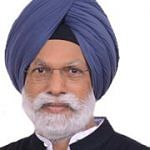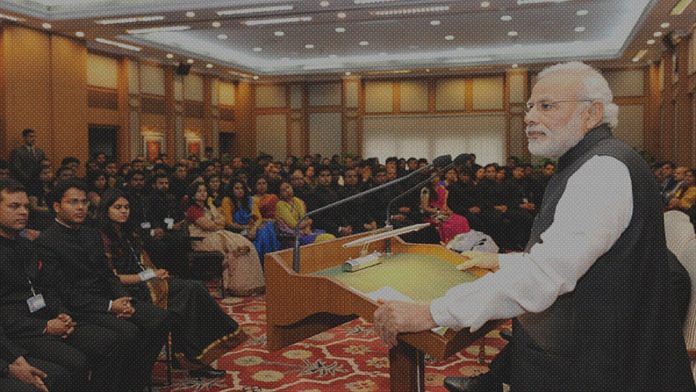The Modi government only has 34 per cent of the IAS officers it should ideally have. The Centre relies on states for its IAS cadre, but the latter is also facing a shortage of officers.
ThePrint asks– Centre’s IAS officers shortage: Need for lateral entry of experts or should states fix gap?
Experience and knowledge of IAS officers can never be replicated by lateral entrants
 Shailaja Chandra
Shailaja Chandra
Former secretary, government of India and former chief secretary, Delhi
There is definitely a shortage of IAS officers in the Centre as well as in the state governments. This is because in the 1990s, recruitment had fallen down to only 50 recruits a year. Now efforts are being made to replenish the shortages by inducting 180 officers per year. It is going to take time for the system to stabilise.
IAS officers are in demand within the states and no CM will release them if there is an internal shortage. Moreover, unlike in the past, officers themselves don’t look at the Centre as a place where they can build careers and get assignments that matter. The state governments have now become more comfortable to work in and more predictable too, if you have an equation with the CM and the party in power. You can go on to lead a life that is satisfying—personally as well as professionally.
If the recruitment is low in the central government, the ministry of personnel has the option of negotiating with the state and persuading 2-3 states every year to fulfil their quota.
As far as the lateral entrants are concerned, one must understand IAS officers are trained in the constitution, law, and economics alike. That experience and knowledge can never be replicated by lateral entrants, regardless of how qualified they are. They cannot really contribute in the area of long-term policy formulation.
There has been a mismatch in how recruitments are being done. The age of recruitment has gone up, and that is creating a problem. By the time officers are 3-4 years into the profession, they are already in their 30s and have grown accustomed to life in the state. The state governments cannot be forced to part with their officers, so the central government has to look for other options. But anyone inducted laterally would have to be recruited through the UPSC. As the years pass, perhaps the IAS will not be the answer for the future of this country because of the way the service has been managed over the last two decades.
We don’t need more IAS officers, we need better IAS officers
 Dr R. Christodas Gandhi
Dr R. Christodas Gandhi
Former additional chief secretary
The IAS is completely ill-fitted for a democratic country like India. They are the most unoriginal lot of individuals who are needed by the politicians for furthering their interest. Not one district magistrate, at least in the past 15 years or so, has come up with any original and planned perspectives for their district. They are merely glorified officers. If their master asks them to bring coffee, they bring coffee.
There is no shortage of IAS officers in the country. We don’t need any more IAS officers than we already have. The country requires better IAS officers, those who are in communion with the people—not in communion with those above them. They do not even have the language to deal with the common person. They only know the language that will send them to the IMF, the UN and the like. Why do we need to send the IAS officers to such institutions? Let them work for the country. Most IAS officers only use the office as a stepping stone to rise up to these global institutions.
The IL&FS institution is another such organisation with hordes of retired IAS officers. Today, it is in such a crisis. I have absolutely no faith in the IAS. Even those in the Election Commission are highly corrupt. In Tamil Nadu, they have been postponing elections for so long. Why? Because their masters want so.
Central government is to blame for crisis in civil services today
 Sanjay Dixit
Sanjay Dixit
Additional chief secretary, Rajasthan
According to me, there are two very obvious reasons behind this shortage. One, there is no clear pathway for progression to central positions. In the past, if you were a joint secretary, the progression to the post of a secretary was more or less assured unless you goofed up big time. Now there is no such certainty. This breeds the atmosphere insecurity and ambiguity in the minds of IAS officers. Introduction of the 360-degree process has completely complicated the issue further and made empanelment of bureaucrats a tougher ask. As a result, the officers too have lost interest and are not opting for appointment at the Centre.
Second, in 2010, the government introduced a new rule stating that only if you have worked at the Centre, will you be eligible for empanelment as the additional secretary. This was an absurd rule that we protested against. It automatically shrinks the pool of eligible officers. Officers from the so-called deprived states, such as the northeast, would earlier come to Delhi and opt to work as additional secretaries. But they too lost interest because of these new rulings. So, I would blame the central government for the crisis we are witnessing today.
To replace the IAS with experts from various fields is not as easy as it seems
 Amar Singh
Amar Singh
Vice President, Punjab Congress and Retd. IAS officer
The IAS is supposed to be the backbone of the government, both in states and the Centre. The numbers worked out by DoPT in terms of the total number of officers’ required at each level are based on ideals, which are hard to achieve, especially given the historical shortfall in direct in-take of IAS officers.
The real shortage of IAS officers in the Central government is felt at the deputy secretary and director levels. Even after the current government’s push to bring in more Central Civil Service officers on CSS deputations, the IAS hold a majority in posts of joint secretary and above rank.
The IAS officers are unique in their training and experience. No one is as equipped to understand the administrative, social and political complexities of the country. To replace the IAS with experts from various fields, therefore, is not as easy as it seems.
It is an established tradition to involve experts in policy formulation. Take for example the involvement of ‘outsiders’ in the erstwhile Planning Commision or the new NITI Aayog, the economic advisor to the government, PM’s Economic Advisory Council, etc. However, the implementation of the policies of the government remains a forte of the civil servant. It is hard to imagine an outsider being able to navigate the maze of rules, procedures and structures with ease.
Therefore, while bringing in external experts is desirable at the policy level, there is no alternative available to boosting the number of IAS officers who are serving in the Centre and states, and this is best achieved through increased direct recruitment.
Also read: In Modi govt, just 4% of IAS officers are from Gujarat cadre, but they hold the key posts
IAS officers now prefer states to Centre; some return to states before tenure is over
 Vijay Singh
Vijay Singh
Former defence secretary and retd. IAS officer
The state officers need to consent to work at the Centre. As per my knowledge, a large number of IAS officers are not opting to work at the Centre. This is quite surprising. In my time, which was quite a while back, people were extremely keen to come and work at the Centre. That doesn’t seem to be the case anymore. People have now begun to find life in the state far easier. If you were to come from a small state to a place like Delhi, just the thought of it may seem quite daunting. From a logistical perspective, having to settle in the capital—transport to finding a school for the kids—may seem intimidating. So much so that quite a few officers who came to Delhi are now returning before completing their tenure. Such is the sorry state of affairs.
In an ideal situation, most IAS officers would want to come to Delhi. For any officer who is professionally keen, actual professional fulfilment lies in Delhi. But today, a large number of mid-level government posts which were filled by IAS are now filled by those from other services. Thus, the number of IAS officers working in mid-level posts in Delhi seems to have shrunk a lot. The Centre needs to take a hard look at why this is the case.
By Fatima Khan, journalist at ThePrint. You can follow her on twitter @khanthefatima.




There is no doubt that India needs a generalist service to hold the administration together like a steel frame. However IAS needs a lot of improvement to fulfill this role. First focus should be on making the selection process sharper. Under the present scheme a number of worthless aspirants get in. Government should spent more money on the examination process to make it difficult for rote learners to get selected. Capability to innovate should be given more weightage.
What we have do
to become a IAS
90% of IAS Officers are like high paid Clerk. So we can bring some retired clerk and give them the job. Secondly, in many of the Smart City project the CEOs are IAS. Better bring some city planner and make them the CEO and take the IAS for small administrative job.
Lateral entry is better option. There are various people who have plenty of talent and due to ill policies such as reservation, concession in age for some segment of people, irrespective of the fact whether they deserve it or not, they deprived of giving tough competition. UPSC can draw policies which will select people through lateral entry and those may be proven better than the people already working on post. How without giving a chance people can comment that people coming through lateral entries will not be able to perform and will not have much experience ? I have seen people got selected in IRS and placed on the post of assistant commissioner of income tax and they not even tell how a deferred tax assets or liabilities are created in financial statement.
The superiority of IAS is a myth. Actually, the IAS has bad been formed just to collect revenue, not to administer state. The parthenium like IAS has spread itself like a weed and took over entire administration and ruling the country and driving away other cadres from their legitimate posts. The rather superiority of IAS, which is just a myth should go and specialists from open market with qualifications should be freely inducted so as to break the almost monopoly of ill-fit group. Atleast we can follow THE USA IN THIS ASPECT.
IAS officers are trained in the constitution, law, and economics as said by Shailaja Chandra
Former secretary, GoI,former CS,Delhi
It is not palatable as by just reading all these are not important in delivery of good to the public rather a good meaningful delivery is important.
India does not want many number of IAS, rather good IAS .
Please sell the nation to ias officers. Dont encourage and train subject specialists. Also in school stop teaching specialist subjects like physics math law biology agriculture. It appears funnt to say ias are unreplicable. Its like saying theres a boy in the class who is fat and healthy because he snatches others boxes and eats. Kudos to the Ias. If there is one area which lacks its the administration which needs serious reforms. even after 70 years of independence people conveniently forget the ills of bad administration. Specialists can fix each sector when reins are given. even the british who had given us ics now follow a different system. Ias bigbrothers please let go and encourage all other services.
Non step by bjp goverment . It’s time to replace government . Indian political system is worst . Indirect democracy is worst .We need direct decomcary .
These one exam wonders who maintain their strangle hold upon the corrupt govt machinery are little more than bell boys for politicians. They have little knowledge of sophisticated technical fields but imagine them lording it over superspecialists and experts. A legacy of British India,These brown Sahib are no more relevant to emergence of India as an economic power.
We don’t need “I AGREE SIR” like officers. We need ” I AM ACTIVE SIR” like officers.
I am ready for vacant post and coming .
We need worthy officers not carrier oriented, blindly obeying politicians